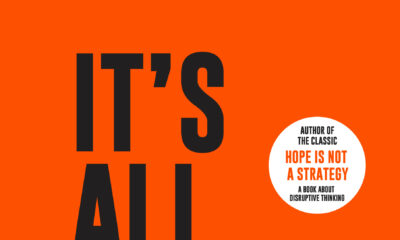Features
Mfonobong Inyang: 2023 Elections Should Be about Strategic Interests, Not Identities
People offering you money for votes look like they are buying votes but they are really buying your allegiance to their sinister agenda.

There are two important words you must grasp because they determine almost every outcome on the face of God’s green earth: strategic interests. They are not just restricted to the lexicon of foreign policy or international relations, successful businesses and individuals always look out for their strategic interests. This election season, you can bet that most of those animating the political space have their strategic interests at the top of their minds. The question is: are you looking out for yours? If you can read this, it effectively means you’re in the minority of literates – large swaths of the population have had illiteracy weaponised against them. So as electorates, they don’t necessarily vote for their enlightened strategic interests but for their respective identities. The 2023 elections present a very rare opportunity for us to execute tactical voting – where we head hunt persons who will deliver the highest returns in terms of good governance. This must be put in the context of nation-building; pursuing our interests in such a way that it doesn’t undermine the progress of the collective.
As a student, which person/party do you think is more likely to: ensure that your education is not interrupted by industrial actions? Allocate more resources to education in the budget? Better secure schools against attacks from anti-education extremists? Revamp the educational curriculum to align with 21st-century realities? Ensure that teachers/professors are well-paid and on time?
As a business person or corporate organisation, which person/party do you think is more likely to: create a more business-friendly environment? Overhaul the ports to be better efficient and more digitally driven? Support start-ups instead of killing them with taxes or predatory policies? Democratise economic opportunities instead of creating unnatural monopolies for cronies? Better manage our fiscal and monetary policies?
As a person or community of faith, which person/party do you think is more likely to: protect your religious freedoms? Allow for more inclusive participation in governance? Be more tolerant of other faiths instead of encouraging religious fanatism by actions or inactions? Promote people on the basis of merit instead of religious affinity? Communicate in a cosmopolitan manner instead of inciting religious divisiveness?
As a woman, which person/party do you think is more likely to: recognise that you’re not subhuman or another piece of furniture in the house? Systematically include and encourage women participation in governance? Prioritise education for the girl-child instead of promoting early marriage? Respect the rights of women instead of policing their actions under the guise of culture? Create more economic opportunities for the women both in inner cities and urban centres?
As a young person, which person/party do you think is more likely to: recognise you’re the most powerful demography this country has? Address the harassment, brutality and profiling from law enforcement officers? Invest in your ideas and ensure your businesses have a fighting chance? Be more tolerant of your vocal criticism instead of banning the platforms you use not just to ventilate but use in earning a living? Have a greater involvement of youths not just as appointees but in elective offices?
As a man, which person/party do you think is more likely to: create an environment where your hard work is recognised and rewarded? Reduce the burden on your financial shoulders by providing the basic amenities you now have to privately fund? Improve the national profile such that you’re not negatively profiled in foreign lands as much as you are now? Will greatly improve the ease of doing business by reducing expensive bureaucracies? Increase your patriotism quotient and make you more invested in the country?
As a farmer, which person/party do you think is more likely to: invest in the potential of agriculture as a major source of revenue and employment? Promote food security by securing farmlands better? Have a sustainable vision for transforming desolate lands into production centres? Encourage more favourable land use policies that make arable land easier to acquire? Invest more in subsiding manufacturing instead of consumption?
As an interest or pressure group, which person/party do you think is more likely to: protect our fundamental rights and uphold the rule of law? Foster national unity instead of institutionalising nepotism as a governance model? Renew the belief of citizens in the judiciary as the hope of the common person? Ensure that institutions are more independent instead of being made to serve sectional interests? Owe fidelity to the constitution and the people instead of executing state capture and pursuing clandestine agendas?
As an investor with vibes like Sabinus, which person/party do you think is more likely to: allow you to repatriate your profits when due? Have more stable economic policies that enable you to plan long-term? Focus on responsible regulation instead of playing as an operator and regulator at the same time? Harmonise the different foreign exchange windows instead of having one for the public and another for cronies? Be more responsive to changing business environments and open to advise from industry stakeholders?
As an employee, which person/party do you think is more likely to: stabilise the value of our currency such that policy-induced inflation doesn’t make your fixed income relatively worthless? Invest massively in critical infrastructure such that you have more savings or disposable income (E.g. Better electricity supply makes you buy less fuel, better roads help you save travel time and other associated social costs)? Improve job security owing to the fact that more prosperity means more employment and greater quality of employment ceteris paribus? Better manage the education system such that you can work and school at the same time instead of losing out on either? Reduce the number of people in your DM asking you for “urgent 2k” because they are also meaningfully engaged, economically?
As a responsible politician, which person/party do you think is more likely to: ensure a more level field of play for all political actors irrespective of political affiliation? Appoint people of integrity into the electoral body instead of infiltrating it with their party stalwarts? Inspire an increased departure from the emphasis on money politics towards issue-based politics? Entrench an electoral process where the citizens decide their leaders and not the courts? Improve the participation of eggheads and technocrats instead of thugs and other incorrigible elements in politics?
As an empath, which person/party do you think is more likely to: communicate and act with a high level of empathy towards the people especially during a crisis? Represent our best and highest ideals on the global stage as a collective? Restore hope to the average person instead to sucking it out through abominable governance? Lead via consensus rather than rule via coercion (Hint: federalism vs feudalism)? Prioritise Nigeria and Nigerians in decision-making over any other regional or international interests?
You see, I learn from the best. Jesus’s decision to have twelve members in His cabinet wasn’t happenstance; twelve, for the Jews, was symbolic of governance and constituted authority. This is why, amongst other things, the establishment accused Him of being “king (a leader over a geopolitical space) of the Jews.” Typically, we refer to Simon Peter as one of His closest disciples and paint Judas Iscariot as the villain. Perhaps in hindsight, yes. However, in real-time, it wasn’t so.
On the cusp of crucifixion, here comes Judas leading hordes of high priests and their militia into the garden to betray his master. Jesus lovingly asked him, “Friend, wherefore art thou come?” Note, He calls someone who sells Him out a friend. However, when Peter, who is supposedly one of those in His inner caucus, talks about defending Him from harm, He gives a rather scathing reply, “Get thee behind me, Satan. Thou art an offence unto me.” Why this strange dichotomy? Simple. Jesus’s agenda on earth was the cross, so anyone whose actions helped Him get there was working for His strategic interests and anyone who did otherwise, was effectively trying to sabotage His mission.
The first Adam wasn’t very self-aware, the enemy came to him also in the garden as a snake but he couldn’t discern. The snake was subtle (a synonym for strategic) not necessarily powerful. Evil looks powerful because it is usually more organised and strategic but those with good intentions aren’t. The last Adam wasn’t emotional, He was emotionally intelligent. His definition of friend or enemy was strictly informed by his strategic interests. Like the Gen Zs say, “He understood the assignment.”
Former US Secretary of State and National Security Adviser, Henry Kissinger, couches it rather brilliantly: “America has no permanent friends or enemies, only interests.” This is an instructive perspective on why your vote should not be tied to identities (partisanship, religion or ethnicity) but to your interests (highest prospects of good governance). Everybody calls out Esau for selling his birthright until it’s time for elections, that’s when the whataboutism and shalaye-ing begins. People offering you money for votes look like they are buying votes but they are really buying your allegiance to their sinister agenda.
Remember those two important words: strategic interests.






















